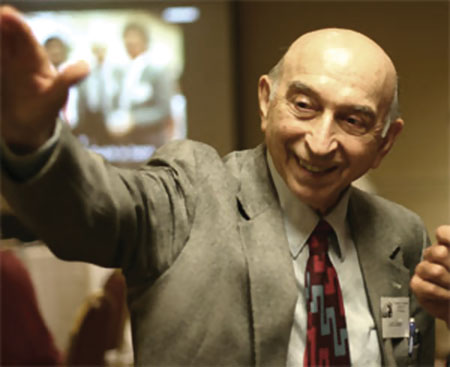The world-renowned Azerbaijani mathematician, artificial intelligence researcher and professor emeritus of computer science at the University of California, Berkeley, Lotfali Rahim Oglu Asgarzadeh, better known as Lotfi A. Zadeh, has passed away at age 96.
Zadeh’s death was announced by the Azerbaijani Consulate in Los Angeles, and was confirmed by a close friend of the family, Professor Shahnaz Shahbazova at Azerbaijan Technical University. Zadeh passed on September 6 at 7:30 AM Pacific Time.
Zadeh’s son Norman said that his father wished to be buried in Azerbaijan, and arrangements are being made to bring Zadeh’s body to Azerbaijan within a week to ten days.
Lotfi Zadeh was born on February 4, 1921 in Baku. His ethnic Azerbaijani father, Rahim Aleskerzade, was a journalist on assignment from Iran, and his Russian-Jewish mother, Fanya Korenman, was a pediatrician from Odessa, a port city on the Black Sea in southern Ukraine.
At the time of Zadeh’s birth, Azerbaijan was a newly-incorporated constituent republic of the Soviet Union. Zadeh attended elementary school for a few years in Baku.
“Those three years, from age seven to ten, had a significant and long-lasting influence on my thinking and my way of looking at things," Zadeh said.
In 1931, the family moved to Tehran as a result of Soviet leader Joseph Stalin's severe immigration policies being enforced. There, Zadeh continued his education in English at a private Presbyterian missionary school, and by 1942 he had graduated from the University of Tehran with a degree in electrical engineering.
After emigrating to the United States, Zadeh attended Columbia University in New York and earned his PhD in 1949. He became an Assistant Professor in Columbia’s electrical engineering department the next year, and went on to teach Systems Theory, the study of the abstract organization of phenomena, independent of their substance, type, or spatial or temporal scale of existence.
In 1952, Zadeh was credited, along with John Ragazzini, with having pioneered the development of the z-transform method in discrete time signal processing and analysis. These methods are now standard in digital signal processing, digital control, and other discrete-time systems used worldwide in industry and research.
After a decade of teaching at Columbia, Zadeh left to become the first chairman of the computer science department at the University of California in Berkeley. He returned to Columbia in 2011 to receive the Egleston Medal, an alumni award that recognizes distinguished achievement in engineering.
Lotfi Zadeh is best known for inventing the concept of "fuzzy logic,” a non-Euclidian approach to calculating probabilities, which he proposed in 1965. Fuzzy Logic is used for notions that cannot be defined in mathematical preciseness, but which rely on identifying gradations, hence the word, "fuzzy.” This form of logic is an approach to computing based on "degrees of truth" rather than the usual "true or false," Boolean logic binary format (using 1 and 0) on which the modern computer is based.
In addition to consumer applications, especially in electronics, Fuzzy Logic is used in the fields of biomedicine, finance, geography, philosophy, ecology, agricultural processes, water treatment, satellite remote sensing, handwriting analysis, nuclear science, weather forecasting and stock market analysis.
Zadeh was once asked in an interview how he came up with the concept of fuzzy logic, to which he replied, “In the world of mathematics, for example, everything has sharp boundaries, either it's a circle or it's not a circle; either the lines are parallel or not parallel. But in the real world, when it comes to ‘Is this person honest, or tall, or beautiful?’ boundaries are fuzzy.”







 Azerbaijan and Armenia started the process of demarcation of their border on Tuesday, with the installation of the first border markers based on ge...
Azerbaijan and Armenia started the process of demarcation of their border on Tuesday, with the installation of the first border markers based on ge...
 Armenian sappers commenced on Monday mine-clearance operations in the territories adjacent to the Saint Mary Church in village of Voskepar (Armenia...
Armenian sappers commenced on Monday mine-clearance operations in the territories adjacent to the Saint Mary Church in village of Voskepar (Armenia...
 As the conflict between Ukraine and Russia escalates, the strategic importance of Kharkiv, Ukraine's second-largest city, has come sharply into focus.
As the conflict between Ukraine and Russia escalates, the strategic importance of Kharkiv, Ukraine's second-largest city, has come sharply into focus.
 President Aliyev emphasized the critical role of the North-South Transport Corridor in fostering transport cooperation between Azerbaijan and Russi...
President Aliyev emphasized the critical role of the North-South Transport Corridor in fostering transport cooperation between Azerbaijan and Russi...



